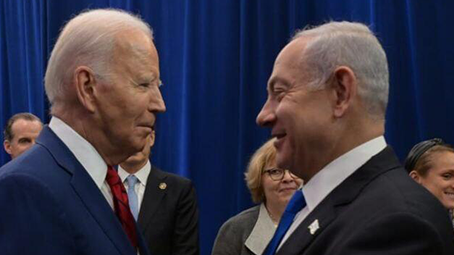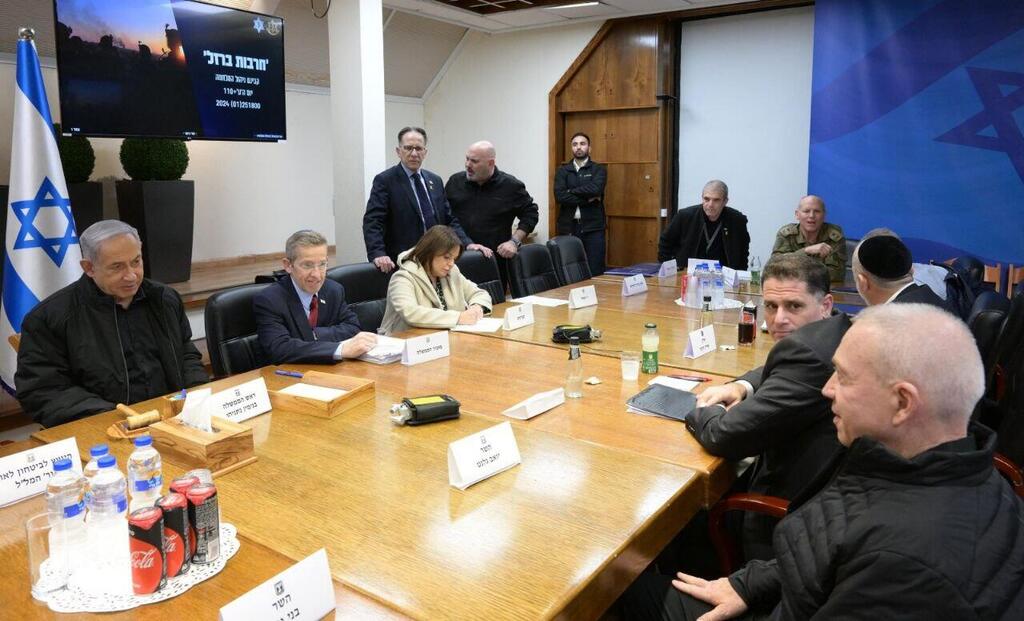U.S. President Joe Biden in a phone call with Israeli Prime Minister Benjamin Netanyahu on Monday afternoon discussed the looming Israeli military operation in Rafah. Prior to this half-hour conversation, the U.S. requested detailed explanations from Israel about the operation. It is anticipated that further dialogue will be held between American and Israeli officials at various levels.
Gazans evacuating Rafah
(Video: Reuters)
An unnamed U.S. official, quoted by Reuters, emphasized the importance of diplomacy. the official said that negotiations for the release of hostages are the best way to avoid an invasion of Rafah. In addition, a spokesperson for the National Security Council told reporters that "we have made our views clear on a major ground invasion of Rafah to the Israeli government," amid growing fears of a full-blown assault.
Izzat al-Risheq, a Hamas senior political figure, issued a stark warning that any Israeli military intervention in Rafah "would jeopardize the negotiations" for a return of the hostages. "It won't be a picnic for the enemy's army. Netanyahu and his government will bear full responsibility," he declared.
Earlier, the terrorist organization appealed to the international community to oppose the Israeli strategy, cautioning that such actions would not only precipitate a "catastrophe in the Gaza Strip" but also "affect the fate of the enemy's prisoners."
Across the border, Egypt has heightened its security posture in the northern Sinai Peninsula, partly in response to concerns that Gazans might attempt to breach the recently erected barriers. The Egyptian Foreign Ministry issued a warning to Israel against further escalations "at a sensitive time in the cease-fire talks," and stated that Cairo is maintaining "contacts with all parties" to prevent the situation from deteriorating.
The Palestinian Authority also commented on the Israeli military preparations, noting that it is engaged in "intensive contacts with regional and international parties, mainly the Americans. The American government must intervene immediately to prevent the massacre in Rafah, which would have dangerous repercussions."
A gradual operation, ready to be suspended at any time
Israel has decided to initiate a limited military operation for now, keeping open the possibility of mediation for a deal. The rationale behind this restrained approach is that it could facilitate a swift return to negotiations should Hamas demonstrate willingness to compromise. A senior Israeli official told Ynet that, although the evacuation of civilians has started, "everything is reversible." He further clarified: "If Hamas agrees to a deal, we can stop the operation."
The War Cabinet only finalized the decision for a staged operation in Rafah Sunday night, beginning with evacuating the population from the city's eastern areas near the Israeli border and proceeding in phases. This decision followed two significant developments: Hamas' persistent demands for an end to the war and a lethal attack from Rafah on Kerem Shalom that resulted in the deaths of four soldiers.
Despite ongoing public threats, primarily from Prime Minister Benjamin Netanyahu, it was only Sunday night – four months since the idea of an operation in Rafah was first proposed – that Netanyahu outlined the initial phase of the operation and sought the War Cabinet ministers' positions. After a thorough discussion, where several questions were raised, the ministers unanimously agreed to move forward with the first phase.
On Monday, an IDF spokesperson stated that "the IDF is expanding the humanitarian area in Al-Mawasi, and calls on the population to temporarily evacuate from the eastern neighborhoods of Rafah to the expanded humanitarian area." This directive was also communicated to the Gazan population in Arabic by the IDF spokesperson.
On Monday morning, the IDF announced that the evacuation would take place through designated routes, urging residents of eastern Rafah to relocate to predefined safe zones north of the city near Al-Mawasi. The military estimates that approximately 100,000 Palestinians from the area are to be evacuated, out of a total of 1.3 million residents and displaced persons in the broader Rafah region.
The operation does not entail a comprehensive evacuation of all of Rafah but focuses on the city's eastern neighborhoods. This includes expanding a pre-defined humanitarian zone equipped with field hospitals and other facilities to ensure adequate maneuverability within the city. The Kerem Shalom goods crossing will remain closed for now and will reopen later based on situational assessments. Meanwhile, other corridors will stay open to ensure the smooth transition of humanitarian aid.






